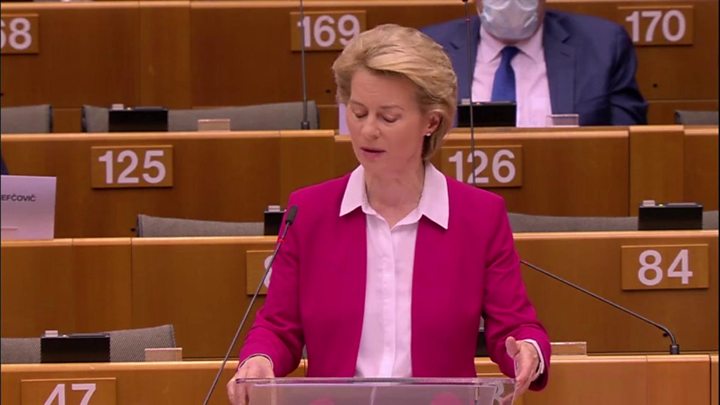
Ursula von der Leyen's proposals will have to please "frugal" states as well as the Southern European countries that need the money most
A recovery fund worth €750bn (£670bn; $825bn) has been proposed by the EU's executive Commission to help the EU tackle an "unprecedented crisis".
The package will be made up of grants and loans for every EU member state.
Economies across the 27-nation EU bloc have been ravaged by the Covid-19 pandemic, but several southern states had big debts even before the crisis.
Commission President Ursula von der Leyen said "this is Europe's moment".
"Things we take for granted are being questioned. None of that can be fixed by any single country alone," she told the European Parliament. "This is about all of us and it is way bigger than any of us."
The Commission has dubbed the plan Next Generation EU. Without the backing of all 27 EU member states, it cannot go ahead. But Germany and France have backed plans for the money to be raised on the capital markets.
Economy Commissioner Paolo Gentiloni said the fund was a "European turning point" that would be added to instruments that had already been launched.
Spain and Italy have seen the highest number of deaths in the EU during the coronavirus crisis and, in the wake of the financial crisis, are particularly keen on grants rather than loans being added to their public debt.
Several "frugal" states object to taking on debt for other countries. Austria, the Netherlands, Denmark and Sweden reject the idea of cash handouts to relatively poorer countries.
What did the Commission president say?
Mrs von der Leyen said the €750bn fund would be made up of €500bn in grants and €250bn in loans. It would be raised by lifting the EU's resources ceiling to 2% of EU gross national income and would be reliant on the EU's strong credit rating.
When added to a proposed €1.1 trillion budget for 2021-27, the €750bn recovery fund would bring to €1.85tn the amount that the Commission says will "kick-start our economy and ensure Europe bounces forward".
When added to an earlier €540bn initial rescue package, that would amount to a total of €2.4tn, said the Commission president.
The EU's much-cherished four freedoms had to be fully restored, she added, those of freedom of people, goods, services and capital.
She said "this is an urgent and exceptional need for an urgent and exceptional crisis".
The money raised on the capital markets would be paid back over 30 years between 2028 and 2058, but not later.
The Commission says it could be paid back in several ways:
Commissioner Maros Sefcovic says recovery has to be based on green and digital policies as well as "increased resilience" and lessons learned from the Covid-19 crisis.
The budget will be "equipped with increased firepower to be able to generate massive investment at the scale and speed needed to kick-start all our economies", he says.
The European Central Bank has played a key role in helping eurozone countries emerge from the debt crisis with its stimulus programme of bond-buying. But concerns about the ECB programme's future were raised earlier this month when Germany's top court ruled that it violated the German constitution.
The UK has left the EU so is unlikely to have any involvement in the fund as it stands.BBC